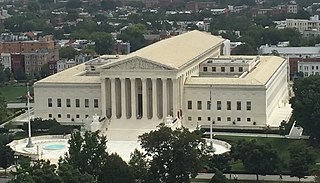
An appellate court, commonly called a court of appeal(s), appeal court, court of second instance or second instance court, is any court of law that is empowered to hear a case upon appeal from a trial court or other lower tribunal. In much of the world, court systems are divided into at least three levels: the trial court, which initially hears cases and considers factual evidence and testimony relevant to the case; at least one intermediate appellate court; and a supreme court (or court of last resort) which primarily reviews the decisions of the intermediate courts, often on a discretionary basis. A particular court system's supreme court is its highest appellate court. Appellate courts nationwide can operate under varying rules.
Jurisdiction is the legal term for the legal authority granted to a legal entity to enact justice. In federations like the United States, the concept of jurisdiction applies at multiple levels.
Precedent is a principle or rule established in a legal case that becomes authoritative to a court or other tribunal when deciding subsequent cases with similar legal issues or facts. The legal doctrine stating that courts should follow precedent is called stare decisis.
In the United States, a state supreme court is the highest court in the state judiciary of a U.S. state. On matters of state law, the judgment of a state supreme court is considered final and binding in both state and federal courts.
In the United States, a state court has jurisdiction over disputes with some connection to a U.S. state. State courts handle the vast majority of civil and criminal cases in the United States; the United States federal courts are far smaller in terms of both personnel and caseload, and handle different types of cases. States often provide their trial courts with general jurisdiction and state trial courts regularly have concurrent jurisdiction with federal courts. Federal courts are courts of limited jurisdiction and their subject-matter jurisdiction arises only under federal law.
The government of California is the governmental structure of the U.S. state of California as established by the California Constitution. California uses the separation of powers system to structure its government. It is composed of three branches: the executive, consisting of the governor of California and the other constitutionally elected and appointed officers and offices; the legislative, consisting of the California State Legislature, which includes the Assembly and the Senate; and the judicial, consisting of the Supreme Court of California and lower courts. There is also local government, consisting of counties, cities, special districts, and school districts, as well as government entities and offices that operate independently on a constitutional, statutory, or common law basis. The state also allows direct participation of the electorate by initiative, referendum, recall and ratification.

The United States courts of appeals are the intermediate appellate courts of the United States federal judiciary. They hear appeals of cases from the United States district courts and some U.S. administrative agencies, and their decisions can be appealed to the Supreme Court of the United States. The courts of appeals are divided into 13 "Circuits". Eleven of the circuits are numbered "First" through "Eleventh" and cover geographic areas of the United States and hear appeals from the U.S. district courts within their borders. The District of Columbia Circuit covers only Washington, DC. The Federal Circuit hears appeals from federal courts across the entire United States in cases involving certain specialized areas of law.
Case law, also used interchangeably with common law, is a law that is based on precedents, that is the judicial decisions from previous cases, rather than law based on constitutions, statutes, or regulations. Case law uses the detailed facts of a legal case that have been resolved by courts or similar tribunals. These past decisions are called "case law", or precedent. Stare decisis—a Latin phrase meaning "let the decision stand"—is the principle by which judges are bound to such past decisions, drawing on established judicial authority to formulate their positions.
An amicus curiae is an individual or organization that is not a party to a legal case, but that is permitted to assist a court by offering information, expertise, or insight that has a bearing on the issues in the case. Whether an amicus brief will be considered is typically under the court's discretion. The phrase is legal Latin and the origin of the term has been dated to 1605–1615. The scope of amici curiae is generally found in the cases where broad public interests are involved and concerns regarding civil rights are in question.

A trial court or court of first instance is a court having original jurisdiction, in which trials take place. Appeals from the decisions of trial courts are usually heard by higher courts with the power of appellate review. Most appellate courts do not have the authority to hear testimony or take evidence, but instead rule solely on matters of law.

The government of Maryland is conducted according to the Maryland Constitution. The United States is a federation; consequently, the government of Maryland, like the other 49 state governments, has exclusive authority over matters that lie entirely within the state's borders, except as limited by the Constitution of the United States.
The federal judiciary of the United States is one of the three branches of the federal government of the United States organized under the United States Constitution and laws of the federal government. The U.S. federal judiciary consists primarily of the U.S. Supreme Court, the U.S. Courts of Appeals, and the U.S. District Courts. It also includes a variety of other lesser federal tribunals.
Ratio decidendi is a Latin phrase meaning "the reason" or "the rationale for the decision". The ratio decidendi is "the point in a case that determines the judgement" or "the principle that the case establishes".

The Supreme Court of Georgia is the highest judicial authority of the U.S. state of Georgia. The court was established in 1845 as a three-member panel, increased in number to six, then to seven in 1945, and finally to nine in 2017. Since 1896, the justices have been elected by the people of the state. The justices are currently elected in statewide non-partisan elections for six-year terms, with any vacancies filled through an appointment by the Governor.
The Superior Court is the state court in the U.S. state of New Jersey, with statewide trial and appellate jurisdiction. The New Jersey Constitution of 1947 establishes the power of the New Jersey courts. Under the State Constitution, "'judicial power shall be vested in a Supreme Court, a Superior Court, and other courts of limited jurisdiction.'" The Superior Court has three divisions: the Appellate Division is essentially an intermediate appellate court while the Law and Chancery Divisions function as trial courts. The State Constitution renders the New Jersey Superior Court, Appellate Division the intermediate appellate court, and "[a]ppeals may be taken to the Appellate Division of the Superior Court from the law and chancery divisions of the Superior Court and in such other causes as may be provided by law." Each division is in turn divided into various parts. "The trial divisions of the Superior Court are the principal trial courts of New Jersey. They are located within the State's various judicial geographic units, called 'vicinages,' R. 1:33-2(a), and are organized into two basic divisions: the Chancery Division and the Law Division".

In Greece, the Hellenic Court of Audit is the supreme audit institution of the Hellenic Republic, auditing the use of public funds in Greece according to the principles of legality, regularity and sound financial management. Synedrio is also the Supreme Financial Court, one of the three Supreme Courts of Justice, grounded on the Constitution, provides for its jurisdictional, advisory and auditing competences.

The Federal Court of Australia is an Australian superior court which has jurisdiction to deal with most civil disputes governed by federal law, along with some summary and indictable criminal matters. Cases are heard at first instance mostly by single judges. In cases of importance, a full court comprising three judges can be convened upon determination by the Chief Justice. The Court also has appellate jurisdiction, which is mostly exercised by a Full Court comprising three judges, the only avenue of appeal from which lies to the High Court of Australia. In the Australian court hierarchy, the Federal Court occupies a position equivalent to the supreme courts of each of the states and territories. In relation to the other courts in the federal stream, it is superior to the Federal Circuit and Family Court of Australia for all jurisdictions except family law. It was established in 1976 by the Federal Court of Australia Act.

The Constitutional Court of Bosnia and Herzegovina is the interpreter and guardian of the Constitution of Bosnia and Herzegovina, It has the appellate jurisdiction over issues arising out of a judgment of any other court in the country, including the constitutional courts of the two entities and the Court of Bosnia and Herzegovina.
The judiciary of Illinois is the unified court system of Illinois primarily responsible for applying the Constitution and law of Illinois. It consists of the Supreme Court, the Appellate Court, and circuit courts. The Supreme Court oversees the administration of the court system.
The judiciary of the Philippines consists of the Supreme Court, which is established in the Constitution, and three levels of lower courts, which are established through law by the Congress of the Philippines. The Supreme Court has expansive powers, able to overrule political and administrative decisions, and with the ability to craft rules and law without precedent. It further determines the rules of procedure for lower courts, and its members sit on electoral tribunals.








